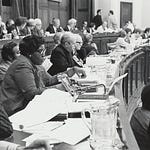
You just heard an excerpt from Vice President Kamala Harris’s response to the new standards for teaching African American history in Florida. Released by that state’s Department of Education on Thursday, July 20, 2023, the standards, as New York Times columnist Jamelle Bouie put it, return Florida’s students to “an older, tendentious approach that either de-emphasized or ignored outright the basic injustice of human bondage in favor of a gloss that placed a more pleasant sheen on an otherwise horrific institution.”
So, on July 21, Harris jettisoned her plans and instead headed to Jacksonville, a historically Black city in northeastern Florida. There, she delivered a blistering response to extremist Republicans who have systematically created a political football out of Florida’s public education system.
Florida had already been in the spotlight for demanding revisions to a new African American studies Advanced Placement course, changes that would affect education across the whole nation. As Governor Ron DeSantis, a 2024 Republican presidential candidate, charged, the course promoted “a political agenda,” not factual knowledge. More importantly, it violated new Florida education laws designed to purge publicly funded classrooms of conversations that might lead students to think about sexuality or racism; or see American history in anything but a positive light.
These laws also make it illegal to teach the history of white supremacy in Florida, a history not accessible in libraries because those books—along with books about queer people—have mostly been removed from that state’s schools and public libraries. This empty curriculum also obscures the historical conditions that have produced social inequality across lines of class, race, and gender in the United States.
But the Florida standards for teaching African American history went a step further, filling a space that ought to be devoted to fact and truth with lies and evasions. For example, they discuss the institution of slavery but not who was responsible for it, that it was physically and psychologically brutal, and that it was followed by a century of disenfranchisement that was systematically enforced by white violence.
Instead, the curriculum features entrepreneurship and independence, conservative values that were certainly denied to African Americans in bondage and often in freedom as well. In perhaps the most well-publicized lie, according to the standards, enslaved people learned skills during their captivity that they could use to take care of their families after Emancipation. When pressed as to which African American lives would be featured, Florida bureaucrats responded with the names of people, many of whom had never been enslaved at all.
In other words, slavery was—beneficial to Black people? White people made the best of a bad situation by encouraging and training the people they held in bondage?
No.
As Bouie points out in his essay, neither of these are new lies: they were promulgated in children’s books and history texts into the 1960s and beyond. Florida’s standards are a zombie curriculum, grimly kept alive by organizations like the United Daughters of the Confederacy and the white supremacist website VDare.
But for generations after Emancipation, these lies were also spread in scholarship, fiction, and popular culture, often accepted by white Americans beyond the South as white southerners, often women presented themselves as “experts” on Black life. For example, in the classic 1939 film made from Margaret Mitchell’s novel Gone with the Wind (1935), plantations are presented only as places of grace and beauty. Enslaved Black people refuse freedom and instead devote themselves to serving and even rescuing the white family that had held them captive.
It took decades of research and publishing, beginning with Black scholars like W.E.B. DuBois, Carter Woodson, Anna Julia Cooper, and John Hope Franklin, to expose the true history of America’s racial past. It is one that might rightly inspire sorrow and shame in young white students today—and that is expressly against the law in Florida.
But here’s the other history the standards don’t tell: that determined Southern white women have also played an important role in fighting white supremacy in the United States. They have a proud tradition of using their status as “experts” on the South to fight the lies that racist politicians tell and to end anti-Black violence. In the absence of any federal or state action, in 1930, Texas suffragist Jesse Daniel Ames launched the Association of Southern Women for the Prevention of Lynching to put an end to political and social terrorism, as well as the false narrative that white women wanted protection from Black men. Novelist Lillian Smith followed suit with her novel Strange Fruit (1944). Southern white women like Dorothy Tilly risked their lives alongside Black activists and students from outside the region in the Black civil rights movement. And contemporary historians raised and educated in the South, like Karen L. Cox, have been leading voices in dismantling the fuzzy, feel-good, fake history that Confederate monuments preserve.
This is why I wanted to bring Jacquelyn Dowd Hall, Julia Cherry Spruill Professor Emerita at the University of North Carolina—Chapel Hill, and the founding director of that university’s Southern Oral History project to our show. She has devoted her career not just to researching and writing a progressive Southern history but also to the possibilities that the South’s racial past offers for a nation where political equality is still unrealized. The author of an award-winning 1979 book about Jesse Daniel Ames, Hall is also famous for her co-authored work on the South’s mill towns.
In this episode, we are talking about her most recent book, Sisters and Rebels: A Struggle for the Soul of America (W.W. Norton, 2019), which tells the story of three sisters, women from the slave-holding Lumpkin family of Georgia. Each woman represents a way that Southern women, and most white people, engaged with history in the twentieth century. Elizabeth became a proud conservative partisan who traveled the post-Reconstruction South giving speeches memorializing the Lost Cause; Grace became a writer, a Greenwich Village bohemian, and a Communist fellow traveler; and Katherine, the youngest, devoted her life to liberal causes and scholarship that exposed the propaganda that kept Black southerners in bondage long after slavery.
You can listen to this podcast by downloading from this newsletter, or you can subscribe for free on Apple iTunes, Spotify, or Soundcloud. You can also find Tiya Miles at her Substack, Carrying Capacity.
If you enjoyed this episode, try:
Episode 8: First, Pick the Right Wife: A conversation with historian Robin Morris, author of "From Goldwater Girls to Reagan Women: Gender, Georgia, and the Growth of the New Right."
Episode 14, The Past Is Never Dead: A conversation with historians Kevin Kruse and Julian Zelizer about their new, best-selling essay collection, "Myth America: Historians Take on the Biggest Legends and Lies About Our Past."
Episode 16, The Sunlit Path of Racial Justice: A conversation with historian Matthew Pratt Guterl about his new book, "Skinfolk: A Memoir."
Episode 30: Inventing A White Race: A conversation with historian and visual artist Nell Irvin Painter about her book, "The History of White People."
Program notes:
Jacquelyn namechecks Phyllis Rose’s Parallel Lives: Five Victorian Marriages (Vintage, 1983.)
Throughout, Claire and Jacquelyn refer to a revisionist history of Southern plantation society and its political commitments, known in the South as the Lost Cause. Perspectives on this political mythmaking can be found in Gary W. Gallagher and Alan T. Nolan, The Myth of the Lost Cause and Civil War History (Indiana University Press, 2000.)
Are you interested in the Southern Oral History Program at the University of North Carolina at Chapel Hill? Check out their website!
Listeners interested in the cult of the Confederacy, as well as the bonds between former Confederates and former Union soldiers formed at reenactments, may wish to read David Blight’s Race and Reunion: The Civil War in American Memory (Belknap Press, 2001.)
Jacquelyn discusses Grace Lumpkin’s immersion in Communist circles and her later disillusionment with the party: Lumpkin writes about this as fiction in her final novel, Full Circle (Western Islands Press, 1962.)
You can learn more about the politics of women’s interracialism, to which Katherine Lumpkin was committed in Nancy Marie Robertson, Christian Sisterhood, Race Relations, and the YWCA, 1906-46 (University of Illinois, 2010.)
Jacquelyn mentions her own rethinking of racial politics in the United States as “the long civil rights movement.” You can read that article, published in the Journal of American History (March 2005), here.













Share this post